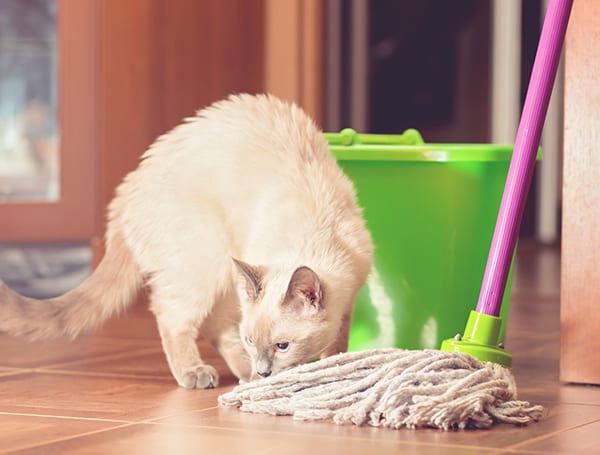Spring Pet Poison Control and Safety for Dogs and Cats in Oakland, CA
We’re strong advocates for pet poison control year-round, but springtime heralds in a wide variety of hazards that can be life-threatening to dogs and cats. From household cleaning supplies, to Easter treats, to various plants and flowers, as your veterinarian in Oakland we consider it our duty to inform pet parents about common, but avoidable, dangers.
If you have any questions for us or need to request a checkup for your pet, please call us at (510) 339-2041. For emergencies, see our after-hours animal emergency referral centers.
Common Spring-Related Poison Hazards for Pets
Take stock of the items you’re using in and around your home. Proper use, storage, and disposal of potentially harmful items goes a long way towards protecting your pet and preventing an unexpected emergency.

Poison oak, poison sumac, and poison ivy are as hazardous to pets as they are to humans, but they’re not the only plants you need to worry about. “True” lilies, including Easter lilies, Daylilies and Tiger lilies, are extremely toxic to cats. Other poisonous plants include Azaleas, Amaryllis, Daffodil, Buttercup, Sago palm, Angel’s trumpet, Autumn Crocus, and Oleander.
In addition to these plants, onions, chives, and garlic are also highly toxic to pets if ingested, be they are raw or cooked. Don’t allow your pet to eat any foods you’ve cooked that contain these ingredients.
Fertilizers can cause anything from mild stomach upset to severe bowel obstruction if ingested in sufficient quantities. The most harmful fertilizers typically contain fungicides, pesticides, and herbicides, along with nitrogen and iron. Meal-based fertilizers can cause dogs to develop stomach concretions, which may result in inflammation of the pancreas.
To reduce your pet’s exposure to harmful fertilizers:
- Water down the areas you’ve fertilized to decrease the scent so it’s less attractive to your pet.
- Cover the fertilized areas with mulch or dirt.
- Try safer fertilizer alternatives, such as seaweed, grass clippings, or compost.
- Hose/wash your pet off if they rolled in fertilizer. Soapy water works just fine, but you can also try mixing white vinegar with water.
- Use an organic liquid fertilizer or soak your granular fertilizer in water for a day and then strain it so there’s nothing on the surface of the soil for your pet to sniff or gobble up.
It’s never okay for your dog or cat to consume sweets made for humans, especially chocolate bunnies and eggs, and artificially-sweetened candies, baked treats, mints, and gum. Sugar-free sweets often contain Xylitol, a highly toxic chemical that metabolizes too quickly in pets, resulting in very low blood sugar and very high insulin levels. Consuming too much Xylitol can be fatal for your pet, so take special care not to leave any treats sitting out where they can reach them.
Grapes and raisins are not necessarily a staple of the Easter holiday, but they are very toxic to dogs and cats. Ingesting enough can damage the kidneys and cause renal failure. If you regularly keep raisins and grapes in your home, store them in a secure place. We also recommend investing in secure, pet-proof waste bins for added safety.
Soaps, detergents, deodorizer, and other cleaning solutions are a must for keeping your home in sparkling condition, but if your pet gets into any of them, they could get sick! Cats are especially prone to injury if they ingest detergent. Ingestion is likely to occur if your pet walks through a puddle of spilled cleaner and later attempts to lick it off. Signs of poisoning may include:
- Heavy drooling
- Burns in the mouth
- Lack of appetite
- Vomiting
- Lethargy
- Trouble breathing
Tidy up detergent spills immediately and store all supplies where your pet can’t reach them.
Let Us Know if Your Dog or Cat Needs Help
You can call us at (510) 339-2041 during our regular office hours if you have concerns or questions.
Additionally, the Pet Poison Helpline is an important educational resource for pet parents. The Pet Poison Helpline phone number is (855) 764-7661 and can go here to see their poison list and get more information.
